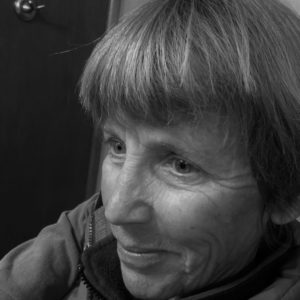 The story goes that when my father’s parents divorced when he was eight, the reason given was not infidelity, moral lassitude, or drunkenness, but messiness. Theirs was an example of the inability of two people to share a life when one was messy and one was neat. There are many apocryphal stories in my family and this may be one of them, but I suspect there’s truth at its core. I remember my grandfather as a buttoned-up man whose passion was fishing. He tied his own flies—an incredibly exacting art—and was a beautiful skier. If you could meet him in the areas in which he excelled, you might feel his love, but he was inflexible in ways that didn’t encourage children.
The story goes that when my father’s parents divorced when he was eight, the reason given was not infidelity, moral lassitude, or drunkenness, but messiness. Theirs was an example of the inability of two people to share a life when one was messy and one was neat. There are many apocryphal stories in my family and this may be one of them, but I suspect there’s truth at its core. I remember my grandfather as a buttoned-up man whose passion was fishing. He tied his own flies—an incredibly exacting art—and was a beautiful skier. If you could meet him in the areas in which he excelled, you might feel his love, but he was inflexible in ways that didn’t encourage children.
I assume he was the neat one.
My grandmother had a raucous laugh and loved whiskey which she drank faithfully at 5 p.m. while sitting on a loveseat in a room filled with books she would never read. More importantly to us, she kept a cupboard full of chocolates. While we ate chocolates she drank whiskey and smoked Lucky Strikes. She was a small human being who cursed and loved with equal ferocity and held court on her sofa where she required us to listen to her stories for hours on end. We were happy to oblige. Somewhere in the world of her descendants there’s a photograph of her looking coquettish, standing next to a man in front of an upside-down plane. Over and over we’d ask for the story and she’d say, “Oh yes, the pilot was so handsome.” “But the plane?” we’d ask. “What happened to the plane?” “Oh, the plane,” she’d sigh. “We went up for a spin and it crashed, just like that.”
I assume she was the messy one.
I grew up in a New York City apartment that even had it been large was not large enough to contain five kids, two parents, a dog or two, a cat or two, turtles, goldfish, a raccoon, and at one point a not-so-successfully descented skunk. Order rarely descended on our home. It was certainly not a given. My father and I were on the neat team and everyone else was comfortable with messiness. I’d watch in fascination, and later in horror, as my siblings stepped out of their clothes at night and left them in a growing pile on the floor. My clothes were laid out on the chair, never touching the ground. My pencils were arranged just so, their tips and erasers lined up on my desk like cadets on a parade ground.
The top of my father’s bureau held, from left to right, his wallet, a small silver cup of loose change, a framed photograph of my mother, a calculator and a pocket knife. There was no deviation from this order, and it was just this order that brought me to tears when I stood before his bureau the morning after he died. It was so familiar. It was an order and organization that defined my dad. But as much as I would miss it and him, my tears were for myself as well. What I saw in his tidy placement of things was not just order but a need to control. He was a man who didn’t believe in death, and this put him at a disadvantage to life. He believed doctors could fix everything, even his pulmonary fibrosis. When that seemed less and less the case, his need to control his circumstances grew more deliberate, more desperate. The predictability he insisted upon had saved him before, had seen him through challenges from his work and his children. His own childhood during the Great Depression, with divorced parents, had offered him plenty of occasion for uncertainty. I turned over the pocket knife and picked up the calculator and switched their places, to demonstrate to myself that I wasn’t my father, that not all neatness was about control, and in the end the long-ago placement of my pencils or the laying out of my clothes on the chair were not going to save me or any of us from the inevitable mess of dying.
I write about my father here because we were in this way so alike. He offered me an example of perfectionism, which has its limited purpose but is one of the many masks of control. My mother was an artist in the kitchen. Ingredients flew around the room and somehow ended up in her casserole in the perfect combination. If she ever followed a recipe I never saw it. She wasn’t the slightest bit cautious, though the fact of children taught her to take care. Unlike my father’s parents, my own parents found their way through messiness—and neatness—to a happy marriage, a complementary marriage. My mother had no precious order to her possessions when she died. She had no need of possessions and in the end no need to push away her death. It was what awaited, what had always awaited, like the next meal to be prepared. She stepped toward it fearlessly, with no belief in any god or any heaven. She waited until the dinner hour, when for all her life we had gathered around her in the kitchen, and when we were there at her bedside, four of her dear ones, she breathed her goodbye.
I am more careful than I wish to be most of the time. I’m more fearful than I let on. The place where this feels particularly painful to me is in my writing. A writer cannot write when afraid. Long ago, fiction was a place where I could feel in control. The story was mine, made up by me and told as I wished to tell it. But I think of fiction differently now. I no longer feel ownership of a story, nor do I feel I make it up. Instead, I borrow it. I have to wait for it, like a girl watching at a window for the first sight of her best friend coming down the street. When I’m fearful, the friend doesn’t come, but on lucky days, when the friend appears, she brings with her the great antidote: the possibility of immersing myself so far into the world unfurling before me, I have no sense of perfectionism or need to control, but instead give in to the great rich messiness of creation.

